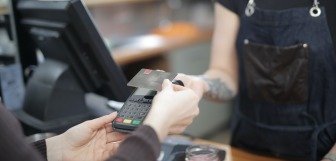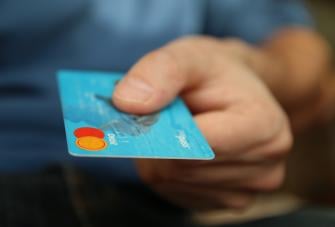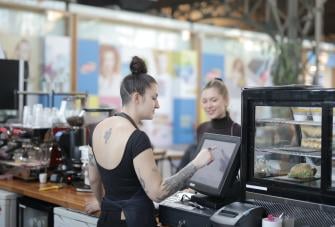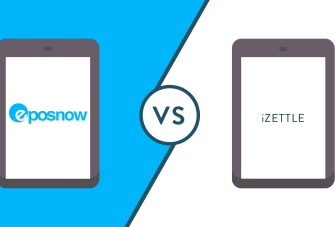Cash Register Vs POS System - What’s the Difference?
Whether you use a cash register or POS System, it will become a vital part of your retail, leisure, or hospitality business. But although both are used to take payments, and sit at the heart of a business, the similarities stop there.
Cash registers and POS systems are in fact very different tools, and deciding which one to pick will have significant implications for the way you operate your business.
What is a Cash Register?
In simple terms, a cash register - otherwise known as a “till” - is a cash management machine used in retail, and other transactional businesses, that calculates totals, records sales, and contains a drawer for storing cash.
The cash register was invented in 1879 by Ohio saloon owner James Ritty who realised there was a real need for a machine that could record sales and keep a record of totals to deter employees from stealing.
The invention of the cash register shifted the retail and hospitality sectors to a new, analytical, and more automated way of conducting business.
What is a POS?
A POS, or Point of Sale System is far more than just an advanced cash register. It centralises your transactions and entire business operation, using a combination of modern software and hardware.
It not only records sales but also helps businesses operate more efficiently by offering more control and increased automation. With a POS system, you can leverage valuable insights to make more informed decisions for your business, thereby reducing costs, maximising sales, and increasing profits.
What is the difference between a cash register and a POS?
The main difference between a cash register and a POS is that the former only has the functionality to manage sales. By contrast, a POS has a full back office suite that allows you to do so much more.
A fully integrated and intuitive POS will help you:
- Manage inventory easily and effectively, saving you hours of time
- Reorder stock when it runs low, so you never miss a sale
- Understand your best selling products so you can plan effective promotions
- Manage your staff to keep a handle on overheads
- Understand customers to generate loyalty and repeat business
A POS system can really help you understand where to scale and where to make savings in order to adapt and future proof your business while boosting profitability.
What’s included in a cash register?
A cash register is a basic machine with limited functionality. What you’ll get in the box is limited to:
- Keypad or touchscreen
- Receipt Printer
- Cash Drawer
What’s included in a POS?
When you buy a POS, you get the hardware and equipment you need; but think of a Point of Sale as a 360 software solution, all stored within the cloud. It does so much more than simply record sales.
Our Complete Solution Includes:
- Fast and responsive multi-touch terminal
- Secure metal cash drawer
- Receipt printer
- Our award-winning software
- Access to over 100 apps and integrations
- Full implementation and customer support
What does POS software do?
Reporting and Data
One of the most valuable features of a POS is reporting and data functionality. Your custom data really can dictate how to run your business in the most efficient and effective way possible.
With a POS and full back-office functionality, you’re able to create custom sales reports that can be sent to your inbox monthly, weekly, or even daily. Your reports will give you full visibility on what’s selling and what’s not to help guide your business decisions. For instance, a POS system will help you identify high-margin items for promotions and underperforming products for discounting.
A POS will also give you full visibility over your workforce. Staff have the ability to clock in and out, and you’ll have access to sales breakdowns by staff member so you can identify your top-performers.
Inventory Management
Understanding your inventory is absolutely vital for your business because it will guide what products to order more of, and what isn’t selling so well so you can stop shrinkage.
Some of our key inventory management features include:
- Add inventory by volume (eg. box or keg size)
- Create dishes by ingredient
- Stock subtracts as it’s sold
- Low stock alerts
- Automatic purchase orders and reordering
With a solid POS, there’s really no need for separate inventory management software or endless spreadsheets as everything is stored in the cloud.
Customer Management
One of the keys to knowing your business is knowing more about your customers. With a good POS system, you are able to store customer data which will allow you to get to know individual customer preferences, allowing you to recommend products, as well as market directly to your customers. Try our MailChimp integration to get started.
App Integrations
A POS is about technology allowing you to work smarter, but not necessarily harder. We have over 100 integrations designed to help scale your business and make you more money.
Some of our most valuable integrations include:
- LoyalZoo: Digital loyalty integration allowing customers to earn and spend reward points
- Xero for Accounting: Sales automatically flow directly into your chosen accounting software
- Shopify: Fully integrated online shop that syncs with your POS system
It’s Completely Customisable
A POS is completely customisable to your individual business needs. Everything from setting up a custom floor plan for your restaurant, to which staff members are allowed to discount and refund.
A POS even works with and integrates with other apps so, for example, you can use Shopify to open an online shop, automate your accounting with Xero or implement a loyalty program with LoyalZoo.
Ease of Use
Finally, a POS should be easy to use. From getting your products set up, to being fully trained should be quick and efficient, and the front till should be well organised and simple for staff to get to grips with so they can serve more customers.




